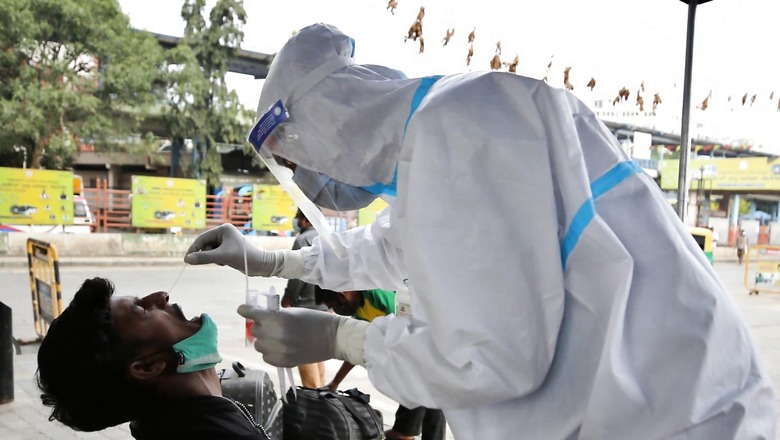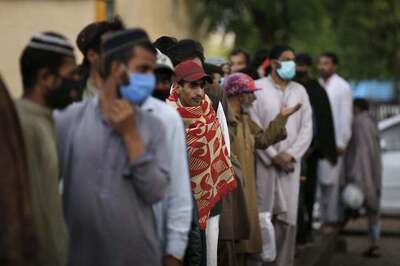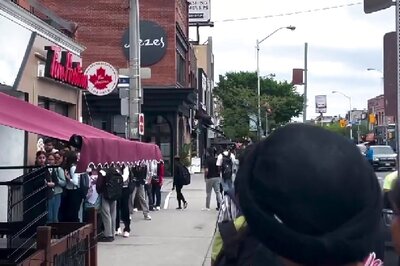
views
Moving away from the ‘test, track and treat’ strategy, the country’s apex medical research institute, the Indian Council of Medical Research (ICMR) on Monday said that contacts of coronavirus patients are not required to undertake a Covid test. The close contacts will only require testing if they are identified as high-risk individuals based on their age or underlying health conditions.
According to public health experts and epidemiologists, the step is in the “right direction” and will help in reducing panic and damage to the economy.
In the early part of the pandemic, the idea was to test as many people as possible. The objective was to reduce transmission and start treatment of those testing positive on a priority basis.
However, according to the experts, the objectives have changed with the advent of the Omicron variant.
Optimal use of resources
“With Omicron, things have changed. The transmission with this variant cannot be controlled beyond a certain point as more than 80% of infected people remain asymptomatic. Hence, increasing testing to reduce transmission will yield no useful results,” said epidemiologist Dr Chandrakant Lahariya.
Secondly, Lahariya said, the tests should be done for the benefit of individuals. “But here, the symptoms are mild. Hence, no treatment is required.”
Other health experts and scientists echoed similar observations. They pointed out that the new testing strategy will help in optimal utilisation of resources: both financial and human.
“In general, it’s a sensible approach,” Dr Gagandeep Kang, vaccine expert and scientist, told News18.com while adding that “on some points a clarification or more thoughts are required”.
According to Dr K Srinath Reddy, a public health expert, contact tracing has no role at this phase of the pandemic.
“There is no point in counting the number of daily cases when we know we must be missing a huge asymptomatic pool of patients. The number of cases will not mean anything except creating panic and inducing regressive measures to pull back the growth of the economy,” said Dr Reddy, who is president of Public Health Foundation of India (PHFI).
The experts suggest that the testing should be used by individuals who have chances of getting serious Covid-19 or those who have significant underlying health conditions.
“Contact tracing and mass testing are no longer required, at least with Omicron. We need to focus on preventing mass gatherings, proper wearing of masks, and the right guidelines for home and hospital care,” Dr Reddy said.
“As a physician and a hospital administrator I welcome the updated ICMR recommendations,” said Dr SP Kalantri, professor of medicine and medical superintendent at Mahatma Gandhi Institute of Medical Sciences, Sevagram.
He pointed towards the updated strategy where ICMR doesn’t advise a Covid test for patients undergoing emergency procedures such as angioplasty and operations.
“Also, patients who lack Covid symptoms and need a planned surgery have been spared of testing, as are pregnant women about to deliver in the hospital. The guidelines also tell us when to test in the hospital as well as in the community and emphasise the role of rapid, do-it-yourself home tests,” he said.
Some decisions need relook: Experts
According to Dr Anant Bhan, adjunct professor and researcher in bioethics at Mangaluru’s Yenepoya University, the step to not encourage testing for those who might have been exposed to Covid-19 by virtue of coming in contact with a person with confirmed infection is “surprising.”
“While this might be aimed at focusing testing on those who are most at risk, this could also exclude those who continue to be vulnerable,” he said, adding, “For example, individuals who have not yet received one or two doses of vaccination. This needs clarification.”
While Dr Kang – a microbiologist and a professor at Christian Medical College, Vellore – encouraged the government’s move, she highlighted, “Why international travellers need to be tested when we have community transmission; this is unclear.”
According to the ICMR’s statement, international travellers arriving at Indian airports, seaports, or any ports of entry will be tested as per laid-down guidelines.
Moreover, the statement said that genome sequencing is to be done for surveillance and it is not required to be undertaken for treatment purposes.
Commenting on the move, Dr Kang said, “Sequencing or identification of Omicron matters for monoclonal antibody treatment, so the statement on sequencing being required only for surveillance is inaccurate for omicron. The monoclonal antibodies available in India work for Delta but not for Omicron. Testing is required for the correct prescription.”
Read all the Latest India News here


















Comments
0 comment